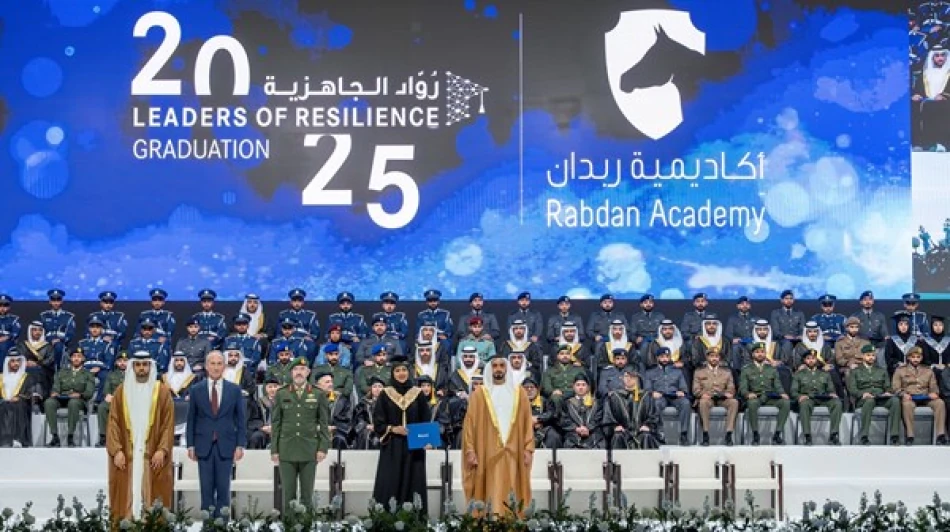
H.H. Sheikh Saif bin Zayed Attends Rabdan Academy's Class of 2025 Graduation Ceremony
UAE Strengthens Security Leadership Pipeline with 233 New Graduates from Elite Rabdan Academy
The UAE has reinforced its strategic commitment to national security and crisis management with the graduation of 233 specialists from Rabdan Academy, including international students from Afghanistan, Indonesia, Tajikistan, and Uzbekistan. This latest cohort represents the Emirates' systematic approach to building regional security expertise while positioning itself as a global hub for specialized defense and emergency management education.
High-Level Recognition Signals Strategic Priority
Sheikh Saif bin Zayed Al Nahyan, Deputy Prime Minister and Minister of Interior, personally attended the 2025 graduation ceremony alongside senior officials from defense, interior, and intelligence agencies. The high-profile attendance—including Dubai's Police Commander-in-Chief and Abu Dhabi's Police Director General—underscores how seriously the UAE treats human capital development in security sectors.
This institutional backing reflects a broader Gulf strategy where nations like Saudi Arabia and Qatar are similarly investing in specialized academies to reduce dependence on foreign security expertise while building indigenous capabilities.
Beyond Domestic Needs: Regional Security Architecture
The inclusion of international students from Central Asia and Afghanistan is particularly noteworthy. While the UAE maintains its traditional focus on domestic security, this outreach suggests an evolving role as a regional security educator and soft power projector.
Strategic Partnerships Through Education
By training security professionals from neighboring regions, the UAE is building long-term relationships that could prove valuable for intelligence sharing, counter-terrorism cooperation, and regional stability initiatives. This mirrors similar programs run by institutions like Singapore's Lee Kuan Yew School of Public Policy or the US National Defense University, which use education to build strategic partnerships.
Comprehensive Security Ecosystem Development
The graduates come from seven specialized programs covering bachelor's and master's degrees in security, defense, emergency management, and crisis response. This comprehensive approach addresses a critical gap in the Middle East, where rapid urbanization and complex security challenges demand sophisticated, multi-disciplinary expertise.
Key institutional partners sending students include the Presidential Court, Abu Dhabi Crown Prince's Court, the Emirates Center for Strategic Studies and Research, and Dubai State Security—indicating deep integration between academic training and operational security needs.
Investment in Human Capital Yields Strategic Returns
Sheikh Saif's emphasis on graduates becoming "pioneers of future readiness" and "ambassadors of knowledge and expertise" signals the UAE's recognition that security challenges increasingly require intellectual rather than purely operational responses. Modern threats—from cyber warfare to climate-induced migration—demand analytical skills that traditional military training may not provide.
Research and Innovation Focus
Dr. Naji Mohammed Al-Sayari, Dean of the College and Director of Research and Innovation, highlighted the academy's dual mission of training personnel and conducting cutting-edge research. This research component positions Rabdan Academy as more than a training facility—it's becoming a think tank for regional security challenges.
Regional Competition and Positioning
The UAE's investment in specialized security education comes as regional competitors expand their own capabilities. Saudi Arabia's Vision 2030 includes significant security sector reforms, while Qatar continues developing its National Security Strategy. The UAE's advantage lies in its established reputation for institutional excellence and its ability to attract international students.
The academy's growing international profile—evidenced by students from four different countries—suggests the UAE is successfully positioning itself as the region's preferred destination for advanced security education, similar to how it has become a financial and logistics hub.
Long-Term Implications for Regional Stability
This graduation represents more than credential conferment—it's part of the UAE's systematic approach to building what military strategists call "institutional resilience." By creating a steady pipeline of trained professionals who understand both local contexts and international best practices, the Emirates is investing in long-term stability rather than reactive security measures.
The emphasis on continuous learning and adaptation, highlighted in Sheikh Saif's remarks, reflects recognition that modern security challenges evolve rapidly and require professionals capable of intellectual flexibility rather than rigid adherence to established protocols.
As regional security challenges become increasingly complex, the UAE's investment in human capital through institutions like Rabdan Academy positions it not just as a consumer of security solutions, but as a producer of security expertise for the broader Middle East and Central Asia.
Most Viewed News

 Layla Al Mansoori
Layla Al Mansoori






